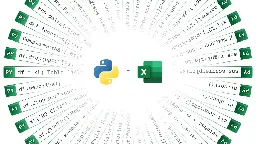Microsoft announces Python formulas in Excel... which have to get sent to the cloud
Microsoft announces Python formulas in Excel... which have to get sent to the cloud

techcommunity.microsoft.com
Announcing Python in Excel: Combining the power of Python and the flexibility of Excel.

Since its inception, Microsoft Excel has changed how people organize, analyze, and visualize their data, providing a basis for decision-making for the flying billionaires heads up in the clouds who don't give a fuck for life offtheline

